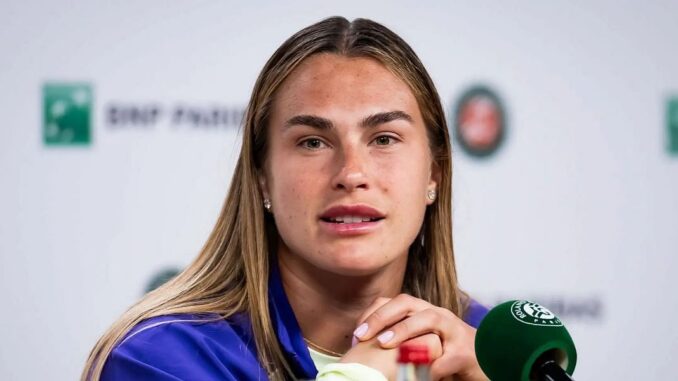
In the heart of Paris, where the red clay of Roland Garros hosts dreams and dramas, Aryna Sabalenka, the world’s top-ranked women’s tennis player, delivered a powerful message after her commanding 6-2, 6-3 third-round victory over Serbia’s Olga Danilovic on May 30, 2025. The Belarusian star, a three-time Grand Slam champion, used her post-match press conference to confront the ghosts of her past, calling out former coaches who once told her she was “stupid” and would never reach the pinnacle of the sport. Her fiery words, laced with defiance and humor, underscored a journey of resilience that has seen her rise from self-doubt to global dominance, while sparking a broader conversation about the role of coaching in tennis.
Sabalenka, now 27, has become a force of nature on the WTA Tour, with 20 singles titles, including back-to-back Australian Open crowns in 2023 and 2024 and the 2024 US Open. Yet, her path to the top was marred by early setbacks, including harsh criticism from coaches at Belarus’ national tennis academy in Minsk. “I’ve heard a lot. Saying I’m not smart enough, that I’m stupid, and I’ll never make it, and I don’t have anything to make it to the top,” she revealed, her voice carrying the weight of those memories. Rather than letting those words break her, Sabalenka responded with a steely resolve. “I was just laughing and saying ‘we’ll see,’” she added, a testament to her unyielding belief in herself. Her blunt message to those former coaches was unmistakable: “I guess I want to send a quick message to them to quit their jobs.” The crowd and media erupted in laughter, but her words carried a serious call for change in a sport where coaching can make or break a player’s spirit.
The Belarusian’s critique wasn’t about being pushed too hard—she’s always been self-motivated, a trait evident in her relentless groundstrokes and fearless court presence, earning her the nickname “The Tiger.” Instead, she condemned the “overbearing and bossy” approach of coaches who belittled her potential. “It’s not about pushing me too hard. I’ve always been quite motivated, and they didn’t have to push me,” she said. Her comments resonate in a sport where mental toughness is as critical as physical prowess. Sabalenka’s own battles with confidence are well-documented, notably in 2022 when her serve unraveled, leading to 440 double faults and moments of despair where she resorted to underhand serves while fighting tears. With the help of biomechanics expert Gavin MacMillan and her current coaches, Anton Dubrov and Jason Stacy, she rebuilt her game, turning a weakness into a weapon that has powered her to the world No. 1 ranking.
Sabalenka’s journey reflects a broader evolution in her approach to adversity. After personal tragedies, including the sudden death of her father in 2019 and her former partner in 2024, she learned to rely on her own mental fortitude rather than external validation. “I realized that nobody other than me would help,” she once said, explaining her decision to part ways with a sports psychologist and tackle her challenges head-on. Her current team, led by the young Dubrov, a former hitting partner who became her head coach at 25, fosters a supportive environment. Their camaraderie is evident in lighthearted moments, like Sabalenka signing Stacy’s head for luck at the 2024 Australian Open or joking about TikTok dances with her team. “They were like, ‘Oh my God, this is so stupid,’” she laughed, describing their playful dynamic.
Her Roland Garros performance underscores her dominance, having dropped just 10 games in three rounds as she prepares to face No. 16 seed Amanda Anisimova in the fourth round. Yet, Sabalenka remains cautious about being labeled the favorite, deferring to Iga Swiatek, the three-time champion. “It’s tough to predict in women’s tennis, you know. Let’s just leave it [the favorite tag] on Iga since she won it, what, three times in a row, really, right?” she said with a smile. Her focus is on the present, a mindset shaped by past struggles and her refusal to let naysayers define her.
Sabalenka’s outspokenness has sparked debate, with fans on social media praising her resilience while some coaches face scrutiny for outdated methods. Her call for kinder, more constructive coaching could reshape how young players are nurtured in tennis academies worldwide. As she powers toward a potential first French Open title, with the women’s final set for June 7, Sabalenka’s story is one of triumph over doubt, proving that the only limits are those you refuse to accept.
Leave a Reply